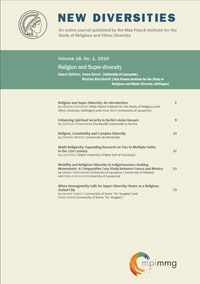Mobility and Religious Diversity in Indigenousness-Seeking Movements: A Comparative Case Study between France and Mexico
by Manéli Farahmand (University of Lausanne / University of Ottawa) and Sybille Rouiller (University of Lausanne)
To cite this article: Farahmand, M., & Rouiller, S. (2016). Steele, L. G. (2016). Multi-Religiosity: Expanding Research on Ties to Multiple Faiths in the 21st Century. New Diversities, 18(1), 53–71. https://doi.org/10.58002/f7cq-x796
In this article, the authors seek to explore spiritual diversity as seen in two contemporary movements that arose in the wake of the New Age and the “2012 Phenomenon”: Mexican neo-Mayanism and French Celtic neo-shamanism. They examine the relationship between the dual mobility of leaders (geographic and spiritual) and the hybridization of symbolic references by focusing on the set of objects, accessories and ritual clothing used by adherents in spiritual practice. Their analyses are based on ethnographic research carried out in France and Mexico between 2012 and 2014. The objects are analyzed in terms of symbolic rearrangements, identity innovation and coexistence of referential systems (glocalization). The authors’ analyses reveal that despite the globalized character of the New Age, the practices and discourses of these groups are heavily influenced by the transnational life pathways of their leaders.
Keywords: indigenous-seeking movements, spiritual hybridization, transnational mobility, ritual objects, New Age, comparative ethnography, Neo-Shamanism, Neo-Mayanism
|
